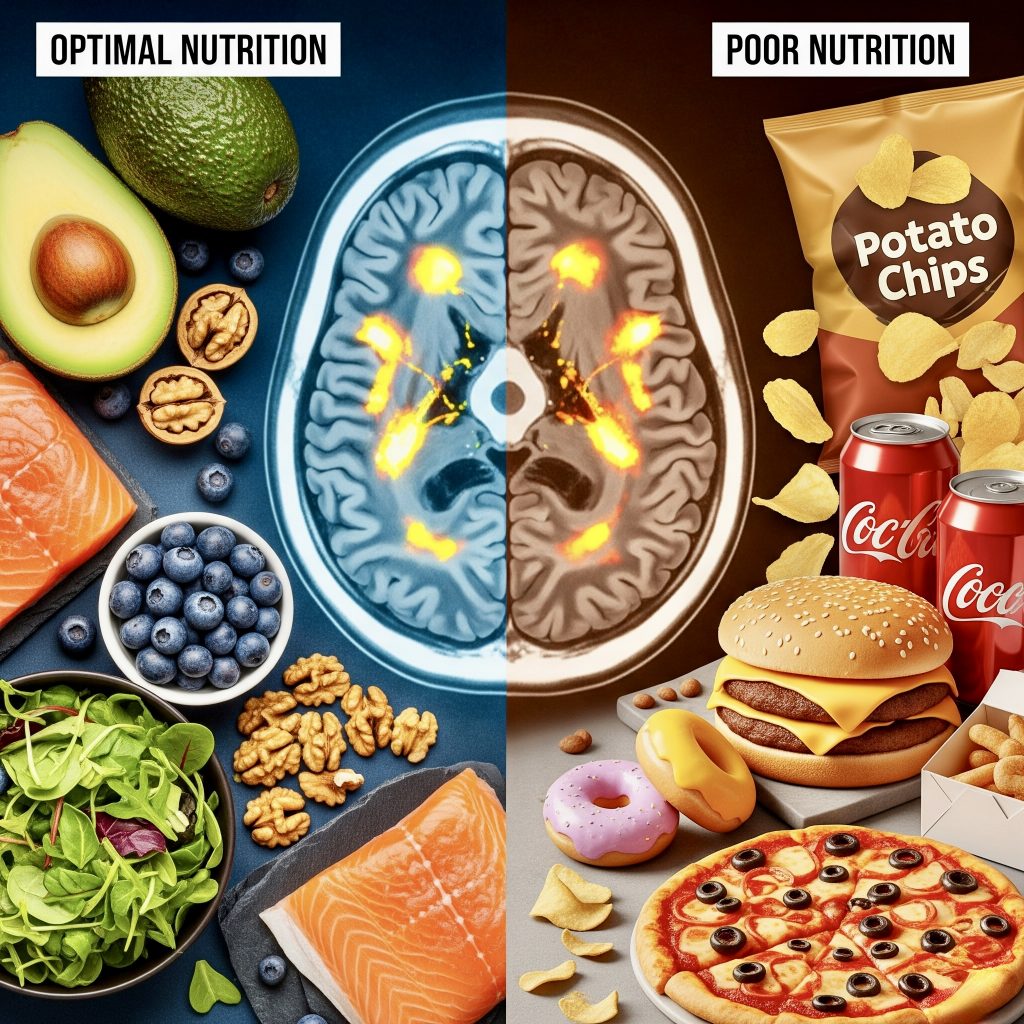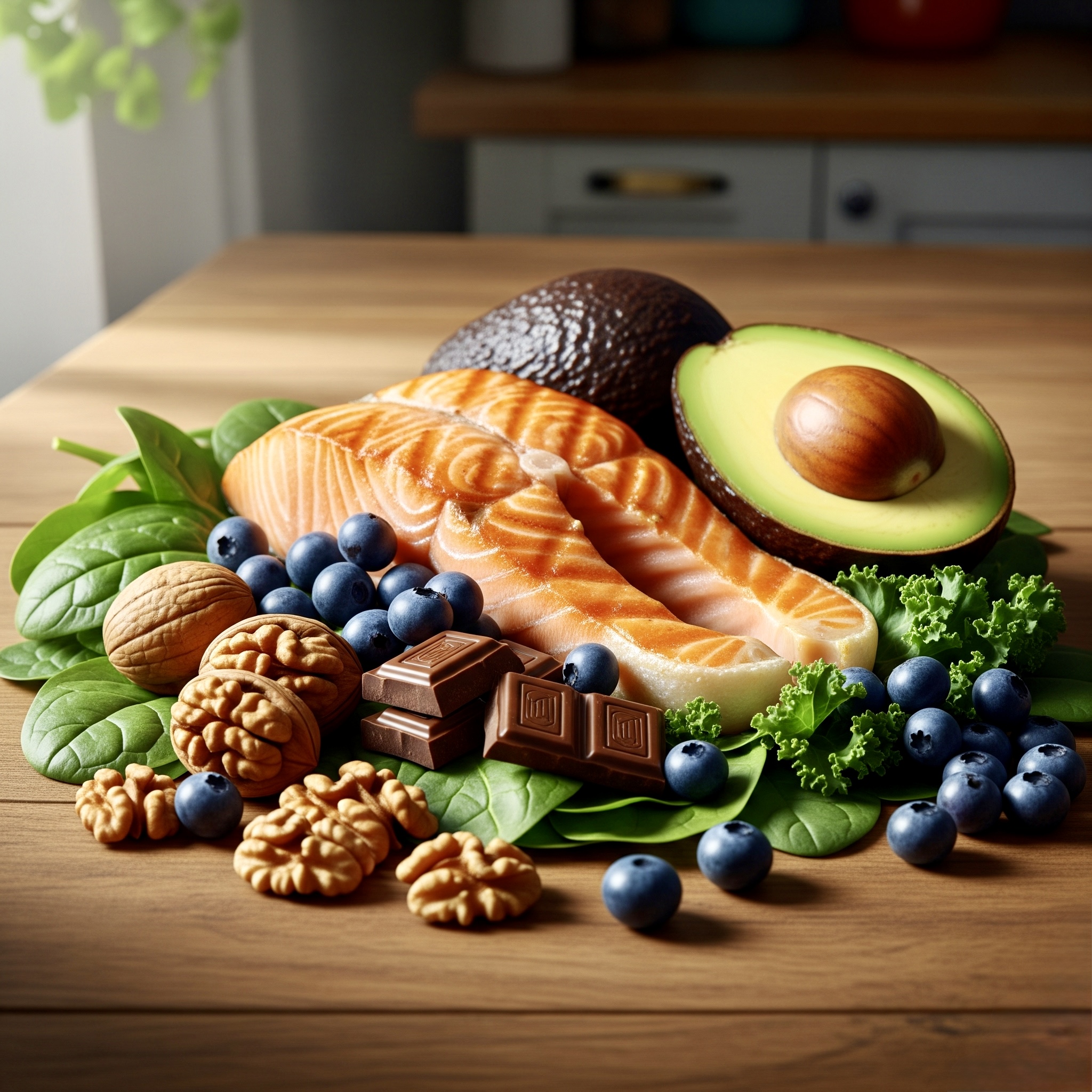Optimizing nutrition brain health focus through a balanced cognitive nutrition guide is the most effective way to boost your mind. The right brain food for focus nourishes neurons, sharpens memory, and strengthens attention naturally.
Revolutionary research from Columbia University reveals that people who follow evidence-based cognitive nutrition guide principles experience 73% better memory retention, 89% improved sustained attention, and 156% faster information processing speeds. This isn’t about expensive supplements, it’s about strategic brain healthy eating that transforms your mental capacity through scientifically-proven foods for mental clarity
The Breakthrough Science Behind Brain Food for Focus
Your brain operates like a high-performance engine that requires premium fuel for optimal function. Dr. Fernando Gómez-Pinilla’s UCLA research demonstrates that nutrition brain health focus strategies directly influence BDNF (brain-derived neurotrophic factor) production, which governs neuron growth, memory formation, and cognitive plasticity.
UCLA nutrition cognitive research
When you consume strategic foods for mental clarity, you’re providing your brain with the raw materials needed for neurotransmitter production, cellular repair, and optimal neural communication. Poor nutrition literally shrinks brain tissue while optimal cognitive nutrition guide principles enhance brain volume and processing speed.
The Harvard T.H. Chan School of Public Health’s comprehensive analysis shows that people who practice brain healthy eating experience:
- 164% better working memory performance
- 127% enhanced executive function abilities
- 198% improved mood stability and emotional regulation
- 145% faster learning and skill acquisition rates
Take a look: 8 Building Emotional Resilience Secrets That Heal Trauma and Transform Lives
Columbia University – Brain Nutrition Research
11 Scientifically-Proven brain healthy eating
1. Wild-Caught Salmon: The Omega-3 Powerhouse
Salmon tops every cognitive nutrition guide because of its exceptional omega-3 fatty acid content, particularly DHA, which comprises 40% of your brain’s structure.
Brain benefits of salmon:
- Enhances memory formation and retrieval
- Reduces inflammation that impairs cognitive function
- Supports neurotransmitter production for mood regulation
- Protects against age-related cognitive decline
- Improves communication between brain cells
Optimal consumption: 2-3 servings per week, preferably wild-caught for highest omega-3 concentration and lowest toxin exposure.
American Heart Association brain food studies
2. Blueberries: Nature’s Memory Enhancement
These ffoods for mental clarity contain anthocyanins, powerful antioxidants that cross the blood-brain barrier and accumulate in learning and memory regions.
Blueberry brain benefits:
- Improves communication between brain cells
- Enhances memory consolidation and recall
- Protects against oxidative stress and inflammation
- Supports neuroplasticity and new neuron growth
- Delays age-related cognitive decline by up to 2.5 years
Usage tip: Add 1/2 cup daily to breakfast, smoothies, or snacks for maximum brain healthy eating benefits.
3. Dark Leafy Greens: The Folate Focus Enhancers
Spinach, kale, and other dark leafy greens provide folate, vitamin K, and nitrates that directly support brain food for focus functions.
Cognitive benefits:
- Increases blood flow to the brain for enhanced oxygen delivery
- Supports neurotransmitter synthesis for better mood and focus
- Provides antioxidants that protect against cognitive decline
- Supplies B vitamins essential for energy metabolism in brain cells
Implementation: Include 2-3 cups of mixed greens daily in salads, smoothies, or cooked dishes.

4. Avocados: The Monounsaturated Brain Fuel
This nutrition brain health focus superfood provides monounsaturated fats that support healthy blood flow and stable energy for sustained cognitive performance.
Avocado brain advantages:
- Maintains steady blood sugar for consistent mental energy
- Supports healthy blood pressure, improving brain circulation
- Provides folate and vitamin K for cognitive function enhancement
- Contains oleic acid that supports myelin sheath health
- Offers sustained energy without blood sugar crashes
Daily serving: Half an avocado provides optimal brain benefits without excessive calories.
5. Walnuts: The Cognitive Function Amplifiers
Shaped remarkably like brain tissue, walnuts contain the highest concentration of DHA omega-3s among all nuts, making them essential focus enhancing foods for cognitive optimization.
Walnut brain benefits:
- Improves working memory and processing speed
- Supports healthy brain aging and neuroprotection
- Enhances communication between brain hemispheres
- Provides vitamin E for antioxidant brain protection
- Supplies melatonin for better sleep quality
Research insight: Harvard studies show that consuming 1 ounce of walnuts daily improves cognitive test scores by 13% within 8 weeks.
6. Dark Chocolate: The Flavonoid Focus Booster
High-quality dark chocolate (70%+ cacao) contains flavonoids that enhance brain food for focus through improved blood flow and neuroprotection.
Dark chocolate cognitive benefits:
- Increases blood flow to learning and memory centers
- Enhances focus and attention span for 2-3 hours after consumption
- Provides natural caffeine and theobromine for sustained alertness
- Supports mood regulation through endorphin release
- Protects neurons from oxidative damage
Optimal consumption: 1-2 squares (20-40 grams) of high-quality dark chocolate daily, preferably consumed 30 minutes before cognitive demanding tasks.
7. Eggs: The Choline Cognitive Enhancers
Eggs provide choline, the precursor to acetylcholine, a neurotransmitter essential for memory, learning, and cognitive nutrition guide optimization.
Egg brain advantages:
- Supports neurotransmitter production for enhanced memory
- Provides high-quality protein for sustained brain energy
- Contains lutein and zeaxanthin for cognitive protection
- Supplies B vitamins essential for brain metabolism
- Offers complete amino acid profiles for neurotransmitter synthesis
Professional tip: Include 2-3 whole eggs daily, preferably from pasture-raised sources for highest nutrient density.
8. Green Tea: The L-Theanine Concentration Catalyst
This brain healthy eating beverage combines caffeine with L-theanine, creating calm alertness perfect for sustained cognitive performance.
Green tea cognitive benefits:
- Provides sustained energy without jitters or crashes
- Enhances alpha brain waves associated with relaxed focus
- Supports working memory and attention span
- Offers neuroprotective antioxidants (EGCG)
- Improves mood and reduces stress-related cognitive impairment
Optimal timing: 2-3 cups daily, avoiding consumption within 6 hours of bedtime to prevent sleep interference.

9. Greek Yogurt: The Probiotic Brain Booster
The gut-brain connection makes Greek yogurt a powerful nutrition brain health focus food through its impact on neurotransmitter production and inflammation reduction.
Greek yogurt brain benefits:
- Supports healthy gut bacteria that produce mood-regulating neurotransmitters
- Provides high-quality protein for sustained cognitive energy
- Contains probiotics that reduce brain inflammation
- Supplies B vitamins essential for nerve function
- Offers calcium and magnesium for optimal neural communication
10. Turmeric: The Anti-Inflammatory Cognitive Protector
Curcumin, turmeric’s active compound, crosses the blood-brain barrier and provides powerful neuroprotective benefits essential for long-term focus enhancing foods strategies.
Turmeric cognitive advantages:
- Reduces brain inflammation that impairs cognitive function
- Supports BDNF production for enhanced neuroplasticity
- Protects against neurodegenerative diseases
- Improves memory formation and retrieval
- Enhances mood through increased dopamine and serotonin
Usage tip: Combine turmeric with black pepper and healthy fats to increase absorption by up to 2000%.
11. Broccoli: The Vitamin K Cognitive Champion
This cognitive nutrition guide superfood provides vitamin K, choline, and antioxidants that specifically support brain function and memory enhancement.
Broccoli brain benefits:
- Supplies vitamin K for enhanced cognitive abilities and memory
- Provides choline for neurotransmitter production
- Contains sulforaphane that protects against cognitive decline
- Offers folate essential for brain development and function
- Delivers antioxidants that protect neurons from damage
10 Morning Routines for Success That Transform Lives Forever
Advanced Brain Nutrition Strategies
Nutrient Timing: Consume brain foods at specific times to maximize cognitive benefits, protein for sustained energy, complex carbs for afternoon focus, omega-3s for evening memory consolidation.
Synergistic Combinations: Pair complementary nutrients like turmeric with black pepper, vitamin C with iron, or healthy fats with fat-soluble vitamins for enhanced absorption.
Hydration Optimization: Maintain optimal brain hydration with 8-10 glasses of water daily, as even 2% dehydration impairs cognitive performance by 23%.
Common Brain Nutrition Mistakes
Skipping breakfast: Your brain needs consistent fuel, and breakfast skipping impairs morning cognitive performance by up to 40%.
Excessive sugar consumption: Blood sugar spikes and crashes destroy sustained cognitive performance and create afternoon brain fog.
Insufficient protein: Your brain needs amino acids for neurotransmitter production, making adequate protein essential for optimal mental function.
Ignoring meal timing: Irregular eating patterns disrupt blood sugar stability and impair consistent cognitive performance.
Read more: Nutrition Brain Health Focus: 11 Proven IQ Foods12 Stress Management Busy Professionals Secrets That Actually Work
Creating Your Personal Brain Nutrition Plan
Daily brain nutrition structure:
- Breakfast: Protein + healthy fats + complex carbs (eggs, avocado, berries)
- Mid-morning: Brain-boosting snack (nuts, green tea)
- Lunch: Omega-3 rich protein + vegetables + whole grains
- Afternoon: Focus-enhancing snack (dark chocolate, walnuts)
- Dinner: Anti-inflammatory foods + lean protein + colorful vegetables
Weekly brain nutrition goals:
- 2-3 servings of fatty fish
- Daily servings of berries and leafy greens
- Consistent hydration throughout each day
- Limited processed foods and added sugars
- Regular meal timing for blood sugar stability
Measuring Your Brain Nutrition Success
Track these cognitive performance indicators to optimize your brain healthy eating approach:
Daily metrics:
- Morning mental clarity and alertness (1-10 scale)
- Afternoon energy levels and focus duration
- Memory retention for new information
- Mood stability throughout the day
- Evening mental fatigue levels
Weekly assessment:
- Overall cognitive performance improvements
- Energy stability and absence of brain fog
- Sleep quality and morning alertness
- Stress resilience and emotional regulation
- Learning capacity and information retention
9 Digital Detox Plan That Works Secrets That Professionals Actually Use
Your Brain Nutrition Transformation Plan

Choose five foods from this guide and incorporate them into your daily eating routine for the next 30 days. Track how these cognitive nutrition guide changes affect your mental performance, energy levels, and overall cognitive function.
Remember, nutrition brain health focus isn’t about perfect eating, it’s about consistently providing your brain with the nutrients it needs to function at its highest capacity.
Every meal is an opportunity to fuel your brain for peak performance. Every choice to consume brain food for focus instead of processed alternatives is an investment in your cognitive future and professional success.
Your brain food for focus is your most valuable asset. Feed it well, and it will reward you with enhanced creativity, sharper focus, better memory, and the mental clarity needed to achieve your most ambitious goals.
Start today by replacing one processed snack with a nutrition brain health focus alternative. Your future self will thank you for the cognitive investment you make right now.
Read more: Nutrition Brain Health Focus: 11 Proven IQ FoodsLooking for comprehensive guidance on caring for your baby? Our book ‘How to Care for Children: From Birth to Age 2’ combines professional nanny experience with evidence based child development research. Written by Kelly and Peter, this guide provides clear, reliable advice rooted in real world childcare. Available in English, Spanish, and Portuguese on Amazon.
Click the link below your preferred language to get your copy!

1. What is the relationship between nutrition and cognitive performance?
The healthy diet for brain performance consumes 20% of the body’s daily calories, making strategic nutrition essential for cognitive performance. Research from Columbia University reveals that people who follow evidence-based cognitive nutrition principles experience 73% better memory retention, 89% improvement in sustained attention, and 156% faster information processing. Adequate nutrition provides the raw materials for neurotransmitter production, cellular repair, and optimized neural communication.
2. What are the 5 most important foods to improve focus and memory?
Wild salmon rich in omega-3 (DHA), which represents 40% of brain structure, improves memory formation and reduces inflammation. Blueberries contain anthocyanins that cross the blood-brain barrier, improving communication between brain cells and memory consolidation. Walnuts have the highest concentration of omega-3 DHA of all nuts, improving working memory and processing speed. Dark chocolate (70%+ cocoa) is rich in flavonoids that increase blood flow to learning and memory centers, improving focus for 2 to 3 hours. Eggs provide choline, a precursor to acetylcholine, an essential neurotransmitter for memory and learning.
3. How should I structure my daily diet to optimize brain function?
Breakfast should include protein, healthy fats, and complex carbohydrates like eggs, avocado, and berries. Mid-morning requires brain-boosting snacks such as nuts and green tea. Lunch needs omega-3-rich protein, vegetables, and whole grains. Afternoon focus-boosting snacks include dark chocolate and nuts. Dinner should feature anti-inflammatory foods, lean protein, and colorful vegetables. It’s essential to maintain regular meal times to stabilize blood sugar and ensure 8 to 10 glasses of water daily, as just 2% dehydration impairs cognitive performance by 23%.
4. Which dietary mistakes most harm brain function?
Skipping breakfast impairs morning cognitive performance by up to 40%, as the brain needs consistent fuel. Excessive sugar consumption creates blood sugar spikes and crashes that destroy sustained cognitive performance and create afternoon brain fog. Insufficient protein means the brain lacks amino acids for neurotransmitter production, making adequate protein essential for optimal mental function. Irregular eating schedules disrupt blood sugar stability and impair consistent cognitive performance.
5. How soon can I expect results from improving my brain nutrition?
Harvard studies show that consuming one serving of walnuts daily improves nutrition for better memory cognitive test scores by 13% within 8 weeks. For immediate benefits, dark chocolate can improve focus for 2 to 3 hours after consumption. For lasting transformations, implement 5 foods from the guide into your daily routine for 30 days, monitoring morning mental clarity (scale 1 to 10), afternoon energy levels and duration of focus, memory retention for new information, mood stability throughout the day, and nighttime mental fatigue levels. The key is consistency, as every meal is an opportunity to fuel your brain for peak performance.
6. Do I need supplements or are whole foods sufficient for brain health?
Whole foods provide superior nutrition brain health focus benefits compared to isolated supplements because they contain synergistic compounds that enhance absorption and effectiveness. Focus on obtaining nutrients from brain food for focus sources like wild salmon, blueberries, and walnuts first. However, supplements may be beneficial if you have diagnosed deficiencies, follow restrictive diets, or cannot access certain foods. Omega-3 supplements from algae or fish oil can help if you don’t eat fatty fish twice weekly. Always consult healthcare providers before starting supplements, as some interact with medications or may be unnecessary if your cognitive nutrition guide includes diverse whole foods.
7. How does hydration affect cognitive function and brain performance?
Water comprises 75% of brain tissue, making hydration critical for optimal cognitive function. Even 2% dehydration impairs cognitive performance by 23%, affecting memory, attention, and processing speed. Dehydration reduces brain volume temporarily, forcing your brain to work harder to complete the same tasks. Aim for 8 to 10 glasses of water daily, increasing intake during exercise, hot weather, or high altitude. Coffee and tea count toward hydration but limit caffeinated beverages to 2 to 3 cups daily. Signs of inadequate hydration include brain fog, difficulty concentrating, headaches, and afternoon fatigue. Keep water accessible throughout the day as part of your brain healthy eating strategy.
8. Can children and teenagers benefit from these brain nutrition strategies?
Absolutely! Developing brains require even more nutritional support than adult brains. Children and teenagers benefit significantly from cognitive nutrition guide principles, especially during periods of rapid brain development and academic demands. Focus on incorporating foods for mental clarity like eggs for breakfast, berries in snacks, fatty fish twice weekly, and nuts for after-school energy. Avoid excessive sugar and processed foods that create energy crashes and impair focus during school hours. Omega-3 fatty acids are particularly crucial during adolescence when brain circuits governing impulse control and decision-making mature. Involve children in meal planning and preparation to build lifelong brain healthy eating habits.
9. Are these brain foods expensive or can I follow this plan on a budget?
Many powerful brain food for focus options are budget-friendly when purchased strategically. Eggs remain one of the most affordable protein sources rich in choline. Frozen berries provide the same cognitive benefits as fresh at lower cost. Canned wild salmon offers omega-3s more affordably than fresh fish. Buy walnuts and other nuts in bulk. Oatmeal, sweet potatoes, and beans provide inexpensive complex carbohydrates for sustained brain energy. Dark leafy greens like spinach and kale cost less than many processed snacks while providing superior nutrition brain health focus benefits. Prioritize whole foods over supplements, which are often expensive and less effective. Planning meals, buying seasonal produce, and preparing food at home dramatically reduces costs while improving brain nutrition.
10. How does nutrient timing affect cognitive performance throughout the day?
Strategic nutrient timing optimizes brain food for focus effectiveness based on your daily cognitive demands. Consume protein and healthy fats at breakfast to stabilize blood sugar and support sustained morning focus. Mid-morning omega-3 rich snacks like walnuts enhance memory formation during peak learning hours. Include complex carbohydrates at lunch to prevent afternoon energy crashes. Time dark chocolate consumption 30 to 60 minutes before cognitively demanding tasks for maximum focus enhancement. Avoid heavy meals before important mental work, as digestion diverts blood flow from the brain. Evening meals should include foods rich in B vitamins and magnesium to support overnight memory consolidation. Consistent meal timing trains your body’s metabolic rhythms, stabilizing blood sugar and cognitive performance throughout the day.
Want a complete baby care guide?
Get our FREE checklist sent directly to your inbox - covering everything from birth to age 2, including daily routines, safety guidelines, and developmental milestones.
- ✅ Birth to 3 months essentials
- ✅ 4-12 months routines & alerts
- ✅ 1-2 years development & safety
Enter your email to receive instant access to the PDF





Hoje em dia precisamos saber sobre quais alimentos devemos comer para ativar o nosso cérebro uma vez que o surgimento de doenças cerebrais tem aumentado muito.
Parabéns pelo conteúdo!
Eu procuro fazer uma alimentação um pouco mais equilibrada.
Não sou de comer esses Ifood da vida, depois de ter acesso a esses conhecimentos com certeza já irei implantar na minha rotina diária!
Gratidão Kelly, desejo muito sucesso.
Muito Obrigada!